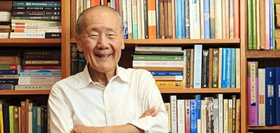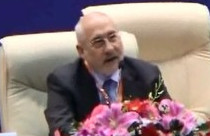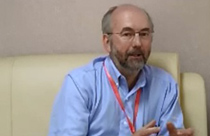EU diplomat speaks on his bond with Chinese classics
Author : JIANG HONG and WANG XIAOZHEN Source : Chinese Social Sciences Today 2019-02-26

Nicolas Chapuis is currently Ambassador of the European Union to China. A French diplomat and sinologist, Mr. Chapuis was born in Neuilly, France, in 1957. His links with China have continuously strengthened as he developed his diplomatic career. He has been posted to China five times as a French diplomat. He assumed his position as EU Ambassador to China in September 2018.
As a sinologist, he has translated many Chinese literature works into French, including Cinq Essais de Poétique by Qian Zhongshu, Le Bain by Yang Jiang, Le Jardin du Repos by Ba Jin, and a collection of the complete poems of Du Fu. The book Tristes Automnes: Poétique de l’identité dans la Chine ancienne is one of his representative monographs.
With his fluent Chinese and profound knowledge of Chinese classics, Nicolas Chapuis, ambassador of the European Union to China, is both a diplomat and a veritable sinologist. Recently, Nicolas Chapuis (Yu Bai) shared with CSST his links with China and Chinese culture.
CSST: How did you get your Chinese name “Yu Bai”?
Nicolas Chapuis: I chose my Chinese name as a young student. I wanted to have a Chinese name that was anchored in the romantic tradition of China. Yu comes from Yu Dafu, unfortunately, now not so much known by the young generation of Chinese; but in the 1920s and 1930s, he was a major Chinese writer. When I was a young student, his writings impressed me. And I like the sound of “Yu.” It’s not a frequent name. Bai is from Li Bai. So, two Chinese writers I like. I chose only two characters because my French family name is two syllables. I must say that today more people in China know me by my Chinese name, especially because of the book I wrote: Tristes Automnes: Poétique de l’identité dans la Chine ancienne.
CSST: It is said that you wrote Tristes Automnes under the encouragement of Chinese scholar Qian Zhongshu. You also translated the works of Qian and those of his wife Yang Jiang, so could you please share your story with them? What has been their impact on your academic research?
Nicolas Chapuis: In one’s life—I think it is true for everybody—you have encounters that change your life. That is the case with me and Qian Zhongshu and Yang Jiang. I met Qian Zhongshu in the spring of 1981. I was a very young diplomat—I was 23 years old and he was already almost 71—and we immediately connected. Guan Zhui Bian (note: which translated into English as Limited Views) had just been published, and I was interested by this masterpiece that exposes the missing links between China and the West. Qian was fluent in English, French, German, Italian . . . he was amazing. What he showed in Guan Zhui Bian is that there is no separation between East and West. The gaps are totally arbitrary. You can use Chinese texts to understand Western philosophy, and you can use Western philosophy to understand Chinese texts. That is incredible. Because he concentrated on the human condition—what it means to be human.
He showed that of course there are differences in approaches and perceptions, but culture is global. Many of the things that China thinks are unique to China just do not exist. It is global; it is human.
I asked Qian Zhongshu why in the official history of Chinese culture or philosophy there has been no humanist moment or movement. He said, of course there was. For him, that humanist moment is the Song Dynasty (960–1279). Not Zhu Xi but Su Shi and Huang Tingjian. If you look at the poems and prose of Su and Huang, you will know there was a humanist moment.
So he said to me, in China we never say things like the West does. The West speaks loud, makes great gestures and screams. But China keeps a low key. It is quiet. He said that you need to scratch the surface. If you go below the surface, everything is there.
Of course he was very critical of Confucians, especially of neo-Confucianism, the Zhu Xi School that put order and discipline above creativity in the way you think. He was a very Taoist person; he loved Zhuangzi. He said if you look at Neo-Taoism (Xuanxue) and Zhuangzi, you will see humanist moments. Even Mencius had a humanist strain.
He was a fan of the Song Dynasty. But later on he told me that to understand the Song you have to understand the Tang (618–907). In his Tan Yi Lu (On the Art of Poetry ) he wrote that some Tang writers like Du Fu were Song people. That is very interesting. I love that.
CSST: What qualities of ancient Chinese poetry do you value the most?
Nicolas Chapuis: I like all of it. Chinese poetry as a whole is important. Personally—that is my feeling—I am more of a “Southern School” person. I prefer Chu Ci (The Verses of Chu ) to the Shijing (Classic of Poetry ).
The poetry of the Northern and Southern Dynasties (420–589) is very interesting. Most of the Tang poetry comes from Liu Song of the fifth century. You have all the southern-tone poetry. In Su Shi and Huang Tingjian of the Song, you have the continuity of the southern inspiration, which is very free with an individual sense of poetry. I think it is in poetry that you find human nature. Chinese poetry has always been individual. Poetry is not a political gesture, it is a personal moment.
CSST: You seem to be most interested in the Tang poets Wang Wei and Du Fu.
Nicolas Chapuis: I used to love Wang Wei, who is a great Tang poet and an easy one. But now I am 100 percent on Du Fu. I am translating the complete works of Du Fu. It is a 30-year project.
Du Fu is very difficult; he is difficult to read, to translate, to grasp. I do that because I think Du Fu is like William Shakespeare for Britain or Victor Hugo for France. He is the root of the Chinese heart, like Hugo is the root of French culture, and Shakespeare is the root of British poetry, drama and history. You cannot understand Britain if you have not read Shakespeare. You cannot understand France if you have not read Hugo, and you cannot understand China if you have not read Du Fu. He is the “Saint of Poetry”, and there is a reason for that. At his time Du Fu was not appreciated. It was only in the Song Dynasty that people realized that his works were pure magic.
CSST: How do you balance your identity both as a sinologist and a diplomat?
Nicolas Chapuis: It’s like day and night. I have my job and my second identity. I graduated in Chinese Studies, not in political science nor international studies. That’s my first training. And I happened to be recruited by the French diplomatic service because of my Chinese knowledge. They needed people who knew Chinese language, culture, history, economy . . . So from the beginning there was a link. And then in the French and European foreign services, I have constantly used my Chinese knowledge. That’s why I’m doing my sixth tour in China. So the link between these two identities has always been very strong.
CSST: What is the overall situation of overseas (or French) Sinology research, and what are the new trends?
Nicolas Chapuis: There is a debate in all countries: Is Sinology only about classical China till 1949, or is it just China-watching about the current economy, politics, society and so on? Most scholars who are engaged in classical studies don’t do modern studies or current research. I do both.
My master’s thesis is about Hua Guofeng. And then because I worked with Qian Zhongshu, I began to work on classical China. I went from current China to classical China. I came to realize that you can’t understand modern China if you don’t understand classical China. Many people think it should not be the case, but I think the continuity is very strong. The more I age, the more I’m interested in the Chinese cultural roots. For example, when President Xi Jinping quotes classical sayings in speeches and writings, that puts many China watchers in a difficult position, because they don’t usually identify the references. For me, I can recognise the connections between today and yesterday.
A trend of Sinology is that more and more people are realizing that. Sinology should be global. In my view, there is a need, also a trend, for Sinology to be more horizontal. China as a study object should not be sliced up. The continuity of the object should be taken into account. But the research is still very specialized. People tend to say I do only classical studies, and in classical studies I do only Ming studies . . . You can cross borders of time or topics. For example, to answer the question of China’s rejuvenation and the Chinese Dream, you need to go back in time.
Also in France, a few years ago, the publishing house named Les Belles Lettres started to edit a collection of Chinese-French bilingual books called Bibliothèque Chinoise. This collection includes major classical works of Confucius, Laozi, Du Fu . . . It’s on a par with the Greek-French and Latin-French bilingual collections, which shows that China stands now at the core of Western Humanist Studies.
CSST: As a witness of China’s reform and opening up over the past four decades, what would you say are the greatest changes you have experienced?
Nicolas Chapuis: The biggest change on which everybody would agree, inside and outside China, is that nobody would envision now a future without China playing a leading role. That was not the case 40 years ago.
In that extraordinary process of the revival of China’s impact on the world, what is changing most are perceptions, so much so that the question of “mutual understanding” is more than ever at the forefront.
How do we avoid misperceptions or misunderstandings? How do we make sure that growing interdependence creates more trust and fewer frictions? These are questions which need to be worked out by our social scientists, in China as well as abroad.
CSST: Poetry is an important part of traditional Chinese culture. China is now vigorously promoting traditional refined culture and establishing Confucius Institutes overseas to increase the understanding of Chinese culture. However, misunderstanding still exists. How to address this?
Nicolas Chapuis: What I would say is, to relate to what I said before, that continuity in culture is very important. In Europe people need to know more about the Chinese mindset, and again as Qian Zhongshu, we need to overcome artificial barriers between Western and Chinese culture.
We need to find ways to open dialogue. It is great if the Chinese government can bring possibilities for dialogue, conferences, translation and funding, and open classical studies to Western students.
I am sure many more economists, historians, sociologists and art critics today can come out like Qian Zhongshu did in the 1980s and show to the world that you have high-level people, thinkers, who belong to the world as a whole.
(edited by MA YUHONG)
Interview with Wang Gungwu on significance of studying overseas Chinese
Wang Gungwu is a distinguished Australian historian who studies overseas Chinese. He currently works at the Faculty o...
-
On the rat/mouse of the zodiac
2020-02-20
-
Regional development calls for Huaihe culture’s soft power
2020-01-10
-
Archaeological discoveries unveil Maritime Silk Road
2020-01-06
-
China’s industrial art printing
2019-12-10
-
Yue-Gan Ancient Road: A journey into Hakka history
2019-05-13
-
The Lantern Festival in Dream of the Red Chamber
2019-02-18














 2011-2013 by www.cssn.cn. All Rights Reserved
2011-2013 by www.cssn.cn. All Rights Reserved